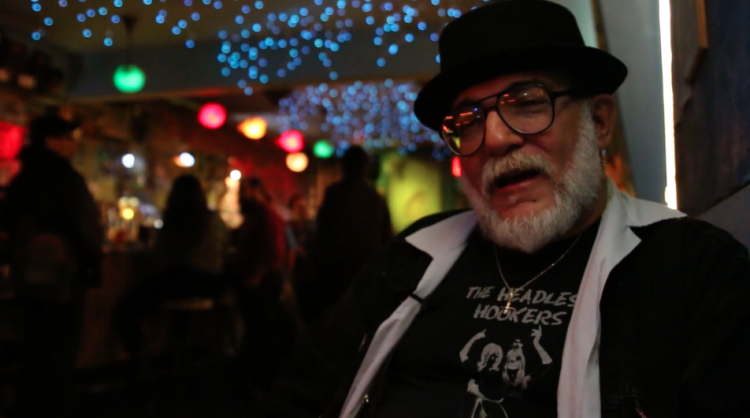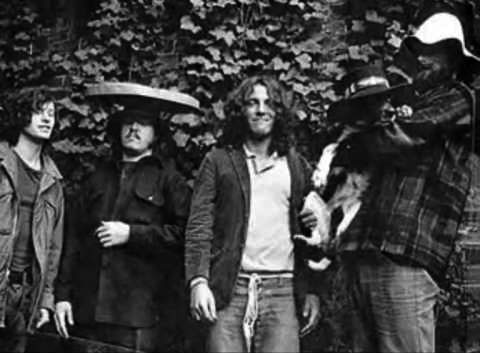
Iconic Music Promoter Frank Wood Talks Beastie Boys, Bruce Springsteen, and the Grateful Dead [INTERVIEW]

The following is a guest post by Jack D’Isidoro
When Frank Wood walks into Otto’s Shrunken Head, a hole-in-the-wall tiki bar on an empty stretch of 14th Street in the Lower East Side, he doesn’t even acknowledge me. Instead, he shuffles past with his cane, asks the woman behind the bar if he has any messages (he doesn’t), and barges into a back closet where he hangs his leather jacket and starts rummaging through PA equipment.
Wood, who will be turning 60 this year, is getting ready for his “Wind Down Sunday,” a weekly showcase of bands he promotes at Otto’s, including his own, Frankie Wood & His NYC All-Stars Band. Born in Brooklyn as Francesco Spavento, the son of an Italian businessman—as he puts it (his father would later be convicted and sent to prison as part of the “Pizza Connection,” a federal drug conspiracy case in which massive amounts of heroin and cocaine were smuggled into New York City and distributed through local pizza joints)—Wood has been promoting and booking bands for over 40 years, having forged his reputation at clubs like CBGB and Max’s Kansas City during the gilded age of new wave and punk in the late 70ss and early 80s.
One of the first bands Wood booked while still in high school was Steel Mill, led by a precocious and still unknown songwriter named Bruce Springsteen. Frank didn’t limit himself to bands playing the Lower East Side, though; he worked security while touring with the Grateful Dead and immersed himself in another burgeoning musical movement emanating from the Bronx at the same time called hip-hop. Wood’s biggest regret: not encouraging a then hardcore-punk trio comprised of three Jewish kids from the Brooklyn to delve into this concurring musical phenomena. They would do it without him and name themselves The Beastie Boys.
Wood sat down with me before his show to tell a few of his many, many stories—some true, some exaggerated, but all well told—in between passersby interrupting us to remind him that they had sent a demo, and were in need of a gig.

Springsteen’s first band, Steel Mill
Jack D’Isidoro: You’re from Brooklyn?
Frank Wood: I’m from Brooklyn, downtown Brooklyn—how ya doing? Yeah, downtown Brooklyn—what they call today Carroll Gardens, alright? We called it Brooklyn, South Brooklyn. You know, Sackett Street, Court Street, near there. My father had lunch wagons inside the gates on the peers underneath the Brooklyn Promenade, what’s now the Brooklyn Bridge Park. That’s where all the shipping used to come in for all the years until the 70s and 80s when containerization came in. So, my father had lunch wagons inside the gates of the peers, so you had to go through customs to get in. He had it at Pier 1, Pier 2, Pier 3 and Pier 6. Pier 1 is over on Furman Street. Pier 1 was the Peruvian and Iranian lines. Pier 2 was the Japanese and the Italian lines. Pier 3 was Grande Columbiana [laughs], and Pier 6 was Atlantic Avenue, the Russian lines. And my father had just a house trailer set up with all the walls knocked down, counter down the middle, and one side were the truck drivers and the longshoremen. On our side were the ovens and the stoves, the grills, the refrigeration. Each one of these things used to make $1,000 a day, back in the 60s.
JD: Feeding these guys…
FW: Feeding these guys because they had no place to go. Have you ever been down there? There’s nowhere else to go. They only had a half-hour lunch, you know? If they were to go up to Brooklyn Heights, which was the only place, there was nothing along the way as it is now. That was all desolate. So they ate at my place. At $1,000 a day—to put it in perspective—a brand new Mustang in that day then cost $2,500. So my old man could’ve bought a new car every day.
JD: And you came from an Italian family?
FW: Yeah, Spavento.
JD: Is your real name ‘Francis’?
FW: Francesco. My father is what we call an “Italian Businessman.” He just passed away recently, but he just did 19 years for a thing called “The Pizza Connection.” They alleged my father was the ringleader of this thing where they were sending 30 kilos of cocaine to Italy and bringing back 10 kilos of heroin and distributing it through the pizza parlors throughout the country. And out of 350 people they busted in this thing, only one person did more than seven years: my father. Because they kept saying, “Who’s your boss? Who’s your boss?” and my father was like, “I don’t know what you’re talking about. I’m an honest Italian businessman. I come from poverty and misery. I come to this country and break my ass.” That’s an Italian expression.
JD: What was it like doing security for the Grateful Dead?
FW: Well, the Dead—I worked the east coast. You know, big shows. Because with the dogs, like I said, I like dogs I don’t have to lean over to pet, and my dogs were trained to attack for the groin. So I’d sit there [whistles] and they would go grrrrr. Because you’re working the back door, and people would be like, “Yo, tell Jerry [Garcia] I’m here.” And I’d say, “No, nobody gets in.” “No, tell Jerry I’m his dealer.” And I was like, “What do you got? That’s not good enough; get out.” Every time the door would open, they’d be like, “Yo, yo, tell Jerry I’m here! Tell Jerry that Mikey’s here!” And they’d be yelling, and it’s like, get away from the door, you know? Now when you have two dogs, I’d be like, “get away from the door,” and the dogs would be like grrrrr and he would start biting at the doorframe and I’d be like, “dude, not my dog.” And they be like, “OK, I’ll move away” [laughs].
JD: And what about the Beastie Boys? You knew them at one point?
FW: Well, I was living in Brooklyn Heights and I had a loft—the only loft in Brooklyn Heights—and it was across the street from St. Anne’s where I think it was Adam who went to school—one of them went to school. So I met them and we were having parties at my loft and they were a hardcore punk band. And they were good. And I was working with them and they were like, we’re going to go on tour. I can work that out. Yeah, we can set that up—load the shit in the hearse! The hearse had rollers in the back. It’s always easier to move the shit in a hearse than in a van. If you’re moving in a van—bang, you’re hitting your head and shit—in a hearse, you just put it down and move the rollers. When there wasn’t that, you put the rug down—had a nice rug like this—all my boys got laid in the back of the hearse. They’d be like, “Frank, I need the keys.” So they said they wanted to go to this hip-hop thing and I’m like, that shit ain’t going nowhere—c’mon, it’s for black guys. They were like, “no, no, we can do it. Can you help us?” So I introduced them. Russell’s [Simmons] like, “what am I gonna do with these white kids?” They got money. Their parents got money. If it wasn’t for them, it would’ve taken hip-hop another ten years to cross over.
JD: Tell me about Bruce Springsteen.
FW: Back then, like I said, I was in the import/export business. And Bruce was having these legal problems, so he was telling everybody we got to keep clean, we got this thing going—don’t ruin it. So he would be hanging at The [Stone] Pony, and everybody else in the band got high. And I was driving a ’62 hearse at the time. And they had a place up by Long Branch. They rented out a house. I don’t know if you’ve ever been down to the shore, but Long Branch to Asbury is one strip. So we’d have somebody—this was before beepers, the 70s right—we’d have somebody hanging out with Bruce at the bar because he drank like a fish back then. When we’d get ready to leave, he’d say, “I gotta take a piss first, let me get on the phone.” The payphone was by the bathroom. Like, “we’re leaving.” Here was the house and here was the bar [motions with hands], and there was only one road. So I would have to drive this way a couple of blocks, over this way and around and come back. And Bruce saw my hearse pass him and then when he got to the house, everyone would be like [smiles widely], “Hi! How are you doing!”
Mr. Frank Wood from Jack D'Isidoro on Vimeo.
Wood acts as MC while a band called The Tarantino’s, who play surf rock and wear black suits straight out of the eponymous director’s Pulp Fiction, open up the night. When they finish, Frank hands around a plastic leprechaun pot and instructs the audience to fill it with green paper pictures of dead white people, which can conveniently be found in their wallets and purses, he says.
Wood’s own band consists of two saxophonists, two guitarists, three female backup singers, a keytarist, a bassist and a drummer, all of whom possess their own New York City musical pedigree and play in several other bands. Never missing an opportunity for promoting his business, Frank intermittently leaves the stage to take pictures of them to presumably put on his website, temporarily leaving the singing duties to the noticeably more talented female vocalists.
After the set, Wood drinks steadily from a beer and removes his oversized glasses to wipe sweat from his forehead. But with two more bands still to play, his night is far from over—and that’s just in the short term. Wood doesn’t plan on retiring soon, either. When asked how long he’ll continue to be a promoter, Wood responded: “Until I die. What else am I going to do?”